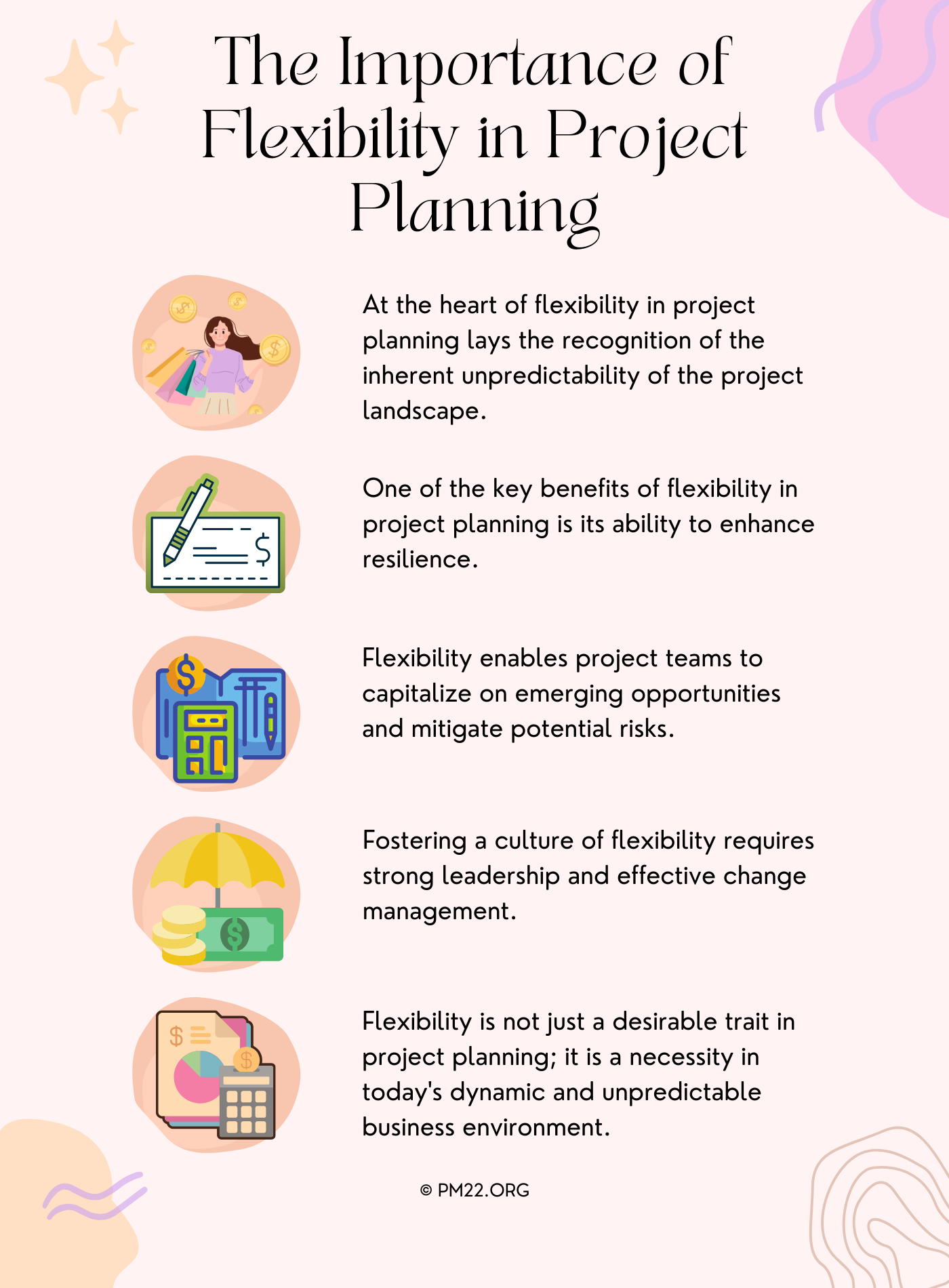 In project management, where uncertainty is the only constant, the ability to adapt and remain flexible is paramount. Regardless of its scale or complexity, every project is subject to unforeseen challenges, shifting priorities, and evolving stakeholder expectations. In such a dynamic environment, rigid adherence to initial plans can be a recipe for failure. This is where the importance of flexibility in project planning shines through, offering a lifeline to navigate the turbulent waters of project execution.
In project management, where uncertainty is the only constant, the ability to adapt and remain flexible is paramount. Regardless of its scale or complexity, every project is subject to unforeseen challenges, shifting priorities, and evolving stakeholder expectations. In such a dynamic environment, rigid adherence to initial plans can be a recipe for failure. This is where the importance of flexibility in project planning shines through, offering a lifeline to navigate the turbulent waters of project execution.
At the heart of flexibility in project planning lies the recognition of the inherent unpredictability of the project landscape. No matter how meticulously a project is planned, variables such as market dynamics, technological advancements, regulatory changes, and resource constraints can disrupt the best-laid plans. Therefore, rather than viewing deviations from the original plan as failures, project managers should embrace them as opportunities for innovation and adaptation.
One of the key benefits of flexibility in project planning is its ability to enhance resilience. By building flexibility into project schedules, budgets, and resource allocations, organizations can better withstand unexpected shocks and setbacks. This resilience is crucial in today’s fast-paced business environment, where agility and responsiveness can mean the difference between success and obsolescence.
CLICK HERE TO DOWNLOAD 300+ PROJECT MANAGEMENT TEMPLATES & DOCUMENTS IN EXCEL
Moreover, flexibility enables project teams to capitalize on emerging opportunities and mitigate potential risks. In a constantly evolving market landscape, being able to quickly pivot in response to new market trends or customer demands can give organizations a competitive edge. Similarly, by proactively identifying and addressing risks as they arise, project teams can minimize their impact on project outcomes and ensure timely delivery.
Furthermore, flexibility fosters collaboration and innovation within project teams. By encouraging open communication and a willingness to explore alternative approaches, project managers can harness the collective expertise and creativity of team members to overcome challenges and drive continuous improvement. In an era where cross-functional collaboration is increasingly essential for success, flexibility catalyzes innovation and synergy.
However, achieving flexibility in project planning requires a shift in mindset and approach. It entails moving away from the traditional waterfall model of project management, characterized by sequential phases and strict dependencies, towards more iterative and adaptive methodologies such as Agile or Scrum. These methodologies prioritize flexibility, iteration, and continuous feedback, allowing teams to adapt to changing requirements and deliver value incrementally.
CLICK HERE TO DOWNLOAD 300+ PROJECT MANAGEMENT TEMPLATES & DOCUMENTS IN EXCEL
Moreover, fostering a culture of flexibility requires strong leadership and effective change management. Project managers must empower their teams to embrace change, experiment with new ideas, and learn from both successes and failures. This requires creating a safe and supportive environment where team members feel encouraged to voice their opinions, challenge existing assumptions, and contribute to continuous improvement.
In conclusion, flexibility is not just a desirable trait in project planning; it is a necessity in today’s dynamic and unpredictable business environment. By embracing flexibility, organizations can enhance resilience, capitalize on opportunities, mitigate risks, foster innovation, and drive continuous improvement. However, achieving flexibility requires a fundamental shift in mindset, approach, and organizational culture. Ultimately, it is the willingness to adapt and evolve in the face of uncertainty that distinguishes successful projects from those that falter.
